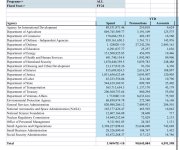You are using an out of date browser. It may not display this or other websites correctly.
You should upgrade or use an alternative browser.
You should upgrade or use an alternative browser.
DOGE Uncover suspicious CC transactions with
- Thread starter J Craft
- Start date
Diogenes
Nemo me impune lacessit
BartenderElite
Verified User
DOGE doesn't have much credibility on their claims.
Diogenes
Nemo me impune lacessit
DOGE doesn't have much credibility on their claims.
Don't they? Which ones?
Diogenes
Nemo me impune lacessit
@J Craft is clickbaiting, apparently. There is no reference to anything "suspicious" or "shady" in the linked article, and DOGE's related post simply says this:
"The US government currently has ~4.6M active credit cards/accounts, which processed ~90M unique transactions for ~$40B of spend in FY24. DOGE is working w/ the agencies to simplify the program and reduce admin costs - we will report back in 1 week."
"The US government currently has ~4.6M active credit cards/accounts, which processed ~90M unique transactions for ~$40B of spend in FY24. DOGE is working w/ the agencies to simplify the program and reduce admin costs - we will report back in 1 week."
Fair enough- here is the balance sheet by department- since these agencies are already funded seems a bit bloated@J Craft is clickbaiting, apparently. There is no reference to anything "suspicious" or "shady" in the linked article, and DOGE's related post simply says this:
"The US government currently has ~4.6M active credit cards/accounts, which processed ~90M unique transactions for ~$40B of spend in FY24. DOGE is working w/ the agencies to simplify the program and reduce admin costs - we will report back in 1 week."

There's a link to the MSN story. If you trust MSN...Like what?
Diogenes
Nemo me impune lacessit
There's a link to the MSN story. If you trust MSN...
MSN is merely an aggregator. There's nothing to "trust". They just republish content on MSN's website. That's Microsoft, in case you didn't know.
What I don't trust is the OP, since there nothing suspicious or shady mentioned in the source article. I followed the embedded link to Doge.gov, and found nothing but a simple statement which I quoted verbatim, in full, with attribution above.
Diogenes
Nemo me impune lacessit
Fair enough- here is the balance sheet by department- since these agencies are already funded seems a bit bloated
View attachment 44028
"Seems".
I don't doubt that there may be some fraud, waste and abuse, but nothing's been proven yet.
Has it?
BTW, do you know what DOGE did with all those government P-cards?

DOGE Puts $1 Spending Limit on Government Employee Credit Cards
The restrictions are already in place at the General Services Administration along with several other agencies. Soon they’ll roll out to most of the federal government, sources say.
Yes, for agencies that are already funded by taxpayer dollars it seems a bit extravagant to spend $40 billion more in a single year."Seems".
I don't doubt that there may be some fraud, waste and abuse, but nothing's been proven yet.
Has it?
BTW, do you know what DOGE did with all those government P-cards?

DOGE Puts $1 Spending Limit on Government Employee Credit Cards
The restrictions are already in place at the General Services Administration along with several other agencies. Soon they’ll roll out to most of the federal government, sources say.www.wired.com
From the Wired link- my comment on this nugget I have quoted is that a Social Security number or card should not be issued to people without providing their birthdate and a birth certificate. So I find the “we just set their birthdate at 1875” (50 years before social security was introduced) puzzling to say the least. and remember there were hundreds of thousands of these.
“For example, Musk has falsely claimed that 150-year-olds were receiving Social Security benefits. Experts told WIRED that DOGE likely overlooked a quirk in the payments system that doles out these benefits, which automatically sets a person’s birthday to May 20, 1875 if the real date is unknown, making these individuals appear to be 150 in the system.”
Diogenes
Nemo me impune lacessit
Yes, for agencies that are already funded by taxpayer dollars it seems a bit extravagant to spend $40 billion more.
"Seems" again?
As of February 20, 2025, there is no conclusive evidence from reliable, authoritative sources that the Department of Government Efficiency (DOGE) has identified and verified specific cases of fraud, waste, or abuse in the federal government.
While DOGE, led by Elon Musk and supported by the Trump administration, has claimed to uncover significant instances of such issues, the data and examples provided so far lack detailed substantiation or independent verification.
Various reports and analyses indicate that DOGE has highlighted certain expenditures and contracts as wasteful, such as Diversity, Equity, and Inclusion (DEI) programs, climate-related initiatives, and specific federal contracts (e.g., $36,000 for DEI at USCIS, $3.4 million for a "Council for Inclusive Innovation," or $57,000 for climate change in Sri Lanka).
However, these examples are often framed as ideological disagreements rather than proven cases of fraud (which requires intent and illegality), waste (extravagant or purposeless spending), or abuse (improper behavior), as defined by the Government Accountability Office.
Critics argue that canceling contracts or programs does not inherently constitute evidence of fraud or waste, and DOGE’s publicized savings—like the $8.5 billion claimed on its website—have been challenged for inaccuracies (e.g., an $8 million ICE contract misreported as $8 billion) and overstatements, with NPR estimating verified cuts at closer to $2 billion.
Supporters, including Trump and Musk, assert that DOGE has found "billions" in waste, fraud, and abuse, pointing to outdated systems (e.g., manual retirement processing in a Pennsylvania limestone mine) or alleged improper payments (e.g., Social Security fraud claims).
Yet, these claims often lack specific documentation or legal confirmation.
For instance, Musk’s assertion of widespread Social Security fraud involving "150-year-olds" appears exaggerated, with data showing only 89,000 beneficiaries over 99, often due to clerical errors rather than systemic fraud. Similarly, while DOGE has accessed sensitive data (e.g., IRS systems) and terminated contracts, no formal reports or court-validated findings have emerged to confirm fraud or abuse at scale.
The absence of detailed, transparent evidence—beyond social media posts and broad statements—has led to skepticism.
Oversight experts and watchdog groups note that while improper payments and inefficiencies exist (e.g., $2.7 trillion in improper payments since 2003 per congressional records), DOGE’s actions have not yet distinguished between policy disagreements and actionable fraud or waste.
Legal challenges and audits (e.g., by the Treasury Inspector General) are underway to scrutinize DOGE’s methods and claims, but results are pending.
In summary, while DOGE has made bold assertions and taken aggressive actions, no verified cases of fraud, waste, or abuse have been definitively documented and independently confirmed as of now.
The narrative remains contested, with more time and transparency needed to assess the validity of their findings.
@Doge
In short, you are jumping the gun to further your narrative. Can't you wait until they have proof? Are they checking Musk's contracts? I kid, of course, they are not."Seems" again?
As of February 20, 2025, there is no conclusive evidence from reliable, authoritative sources that the Department of Government Efficiency (DOGE) has identified and verified specific cases of fraud, waste, or abuse in the federal government.
While DOGE, led by Elon Musk and supported by the Trump administration, has claimed to uncover significant instances of such issues, the data and examples provided so far lack detailed substantiation or independent verification.
Various reports and analyses indicate that DOGE has highlighted certain expenditures and contracts as wasteful, such as Diversity, Equity, and Inclusion (DEI) programs, climate-related initiatives, and specific federal contracts (e.g., $36,000 for DEI at USCIS, $3.4 million for a "Council for Inclusive Innovation," or $57,000 for climate change in Sri Lanka).
However, these examples are often framed as ideological disagreements rather than proven cases of fraud (which requires intent and illegality), waste (extravagant or purposeless spending), or abuse (improper behavior), as defined by the Government Accountability Office.
Critics argue that canceling contracts or programs does not inherently constitute evidence of fraud or waste, and DOGE’s publicized savings—like the $8.5 billion claimed on its website—have been challenged for inaccuracies (e.g., an $8 million ICE contract misreported as $8 billion) and overstatements, with NPR estimating verified cuts at closer to $2 billion.
Supporters, including Trump and Musk, assert that DOGE has found "billions" in waste, fraud, and abuse, pointing to outdated systems (e.g., manual retirement processing in a Pennsylvania limestone mine) or alleged improper payments (e.g., Social Security fraud claims).
Yet, these claims often lack specific documentation or legal confirmation.
For instance, Musk’s assertion of widespread Social Security fraud involving "150-year-olds" appears exaggerated, with data showing only 89,000 beneficiaries over 99, often due to clerical errors rather than systemic fraud. Similarly, while DOGE has accessed sensitive data (e.g., IRS systems) and terminated contracts, no formal reports or court-validated findings have emerged to confirm fraud or abuse at scale.
The absence of detailed, transparent evidence—beyond social media posts and broad statements—has led to skepticism.
Oversight experts and watchdog groups note that while improper payments and inefficiencies exist (e.g., $2.7 trillion in improper payments since 2003 per congressional records), DOGE’s actions have not yet distinguished between policy disagreements and actionable fraud or waste.
Legal challenges and audits (e.g., by the Treasury Inspector General) are underway to scrutinize DOGE’s methods and claims, but results are pending.
In summary, while DOGE has made bold assertions and taken aggressive actions, no verified cases of fraud, waste, or abuse have been definitively documented and independently confirmed as of now.
The narrative remains contested, with more time and transparency needed to assess the validity of their findings.
@Doge
Diogenes
Nemo me impune lacessit
In short, you are jumping the gun to further your narrative.
Am I?
Can't you wait until they have proof?
I can.
Are they checking Musk's contracts?
Aren't they?
I kid, of course, they are not.
Who told you that?
Yes, “seems”. Discovering how money is spent is phase 1. Tracing that money to ensure that it went to, and was used for, the purposes intended is phase 2. In conjunction with this is eliminating those programs that don’t align with the presidents agenda. Or are a waste of taxpayer funds."Seems" again?
As of February 20, 2025, there is no conclusive evidence from reliable, authoritative sources that the Department of Government Efficiency (DOGE) has identified and verified specific cases of fraud, waste, or abuse in the federal government.
While DOGE, led by Elon Musk and supported by the Trump administration, has claimed to uncover significant instances of such issues, the data and examples provided so far lack detailed substantiation or independent verification.
Various reports and analyses indicate that DOGE has highlighted certain expenditures and contracts as wasteful, such as Diversity, Equity, and Inclusion (DEI) programs, climate-related initiatives, and specific federal contracts (e.g., $36,000 for DEI at USCIS, $3.4 million for a "Council for Inclusive Innovation," or $57,000 for climate change in Sri Lanka).
However, these examples are often framed as ideological disagreements rather than proven cases of fraud (which requires intent and illegality), waste (extravagant or purposeless spending), or abuse (improper behavior), as defined by the Government Accountability Office.
Critics argue that canceling contracts or programs does not inherently constitute evidence of fraud or waste, and DOGE’s publicized savings—like the $8.5 billion claimed on its website—have been challenged for inaccuracies (e.g., an $8 million ICE contract misreported as $8 billion) and overstatements, with NPR estimating verified cuts at closer to $2 billion.
Supporters, including Trump and Musk, assert that DOGE has found "billions" in waste, fraud, and abuse, pointing to outdated systems (e.g., manual retirement processing in a Pennsylvania limestone mine) or alleged improper payments (e.g., Social Security fraud claims).
Yet, these claims often lack specific documentation or legal confirmation.
For instance, Musk’s assertion of widespread Social Security fraud involving "150-year-olds" appears exaggerated, with data showing only 89,000 beneficiaries over 99, often due to clerical errors rather than systemic fraud. Similarly, while DOGE has accessed sensitive data (e.g., IRS systems) and terminated contracts, no formal reports or court-validated findings have emerged to confirm fraud or abuse at scale.
The absence of detailed, transparent evidence—beyond social media posts and broad statements—has led to skepticism.
Oversight experts and watchdog groups note that while improper payments and inefficiencies exist (e.g., $2.7 trillion in improper payments since 2003 per congressional records), DOGE’s actions have not yet distinguished between policy disagreements and actionable fraud or waste.
Legal challenges and audits (e.g., by the Treasury Inspector General) are underway to scrutinize DOGE’s methods and claims, but results are pending.
In summary, while DOGE has made bold assertions and taken aggressive actions, no verified cases of fraud, waste, or abuse have been definitively documented and independently confirmed as of now.
The narrative remains contested, with more time and transparency needed to assess the validity of their findings.
@Doge
Fraud, waste, and abuse is an over arching description to communicate in general terms, what is being uncovered by DOGE.
The 2 billion to Stacey Abrams connected organizations, looks to be outright fraud. We’ll find out as an investigation has begun.
Last edited:
Diogenes
Nemo me impune lacessit
Yes, “seems”. Discovering how money is spent is phase 1.
I agree. But you titled this thread. I did not. Was it your intention to mislead, or did you simply fail to check your source?
I provided the headline that Elon Musk used on X. I looked it up on MSNBC, because I wanted to provide an article from a left of center news source that shows he really did uncover it. That he also finds it suspicious, given the rationale I’ve talked about as well; It’s a lot of money to spend in one year by departments that are already fully funded.I agree. But you titled this thread. I did not. Was it your intention to mislead, or did you simply fail to check your source?
Diogenes
Nemo me impune lacessit
I provided the headline that Elon Musk used on X. I looked it up on MSNBC, because I wanted to provide an article from a left of center news source that shows he really did uncover it. That he also finds it suspicious, given the rationale I’ve talked about as well; It’s a lot of money to spend in one year by departments that are already fully funded.
Well, how'd that turn out for you?
BTW, you may have "looked it up on MSNBC", but you didn't cite MSNBC.
tigerred59
Verified User
ANYBODY TRUSTING, BELIEVING, ACCEPTING AS FACT ANYTHING COMING FROM PRESIDENT ELON AND HIS SIDE KICK TRUMP IS A DAMN FOOL.
Fine-Well, how'd that turn out for you?
BTW, you may have "looked it up on MSNBC", but you didn't cite MSNBC.
You’re correct, I cited MSN in my original post minus the BC- thanks for the correction


